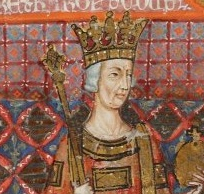
Back شارل الثاني، ملك نابولي Arabic شارل التانى ARZ Карл II Анжуйскі Byelorussian Шарл II Анжуйски Bulgarian Carles II d'Anjou Catalan Karel II. Neapolský Czech Karl II. (Neapel) German Κάρολος Β΄ της Νεαπόλεως Greek Carlos II de Anjou Spanish Karlos II.a Napolikoa Basque
| Charles II | |
|---|---|
 King Charles II from the Bible of Naples, c. 1340 | |
| King of Naples Count of Provence and Forcalquier | |
| Reign | 7 January 1285 – 6 May 1309 |
| Coronation | 29 May 1289 |
| Predecessor | Charles I |
| Successor | Robert |
| Count of Anjou and Maine | |
| Reign | 7 January 1285 – 16 August 1290 |
| Predecessor | Charles I |
| Successor | Margaret & Charles III |
| Prince of Achaea | |
| Reign | 7 January 1285 – 16 September 1289 |
| Predecessor | Charles I |
| Successor | Isabella and Florent |
| King of Albania | |
| Reign | 7 January 1285 – 13 August 1294 |
| Predecessor | Charles I |
| Successor | Philip I, Prince of Taranto |
| Born | 1254 |
| Died | 5 May 1309 (aged 54–55) Naples, Kingdom of Naples |
| Spouse | Maria of Hungary |
| Issue More | |
| House | Anjou-Naples |
| Father | Charles I of Naples |
| Mother | Beatrice of Provence |
Charles II, also known as Charles the Lame (French: Charles le Boiteux; Italian: Carlo lo Zoppo; 1254 – 5 May 1309), was King of Naples, Count of Provence and Forcalquier (1285–1309), Prince of Achaea (1285–1289), and Count of Anjou and Maine (1285–1290); he also was King of Albania (1285–1294), and claimed the Kingdom of Jerusalem from 1285. He was the son of Charles I of Anjou—one of the most powerful European monarchs in the second half of the 13th century—and Beatrice of Provence. His father granted Charles the Principality of Salerno in the Kingdom of Sicily (or Regno) in 1272 and made him regent in Provence and Forcalquier in 1279.
After the uprising known as the Sicilian Vespers against Charles's father, the island of Sicily became an independent kingdom under the rule of Peter III of Aragon in 1282. A year later, his father made Charles regent in the mainland territories of the Regno (or the Kingdom of Naples). Charles held a general assembly where unpopular taxes were abolished and the liberties of the noblemen and clerics were confirmed. He could not prevent the Aragonese from occupying Calabria and the islands in the Gulf of Naples. The Sicilian admiral Roger of Lauria captured him in a naval battle near Naples in 1284. As he was still in prison when his father died on 7 January 1285, his realms were ruled by regents. The remainder of his rule was spent seeking a resolution to the Sicilian war, diplomatic moves concerning his inheritance, and administrating the new Kingdom of Naples.